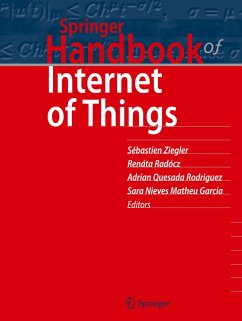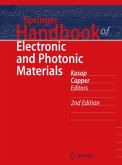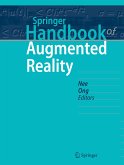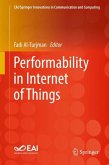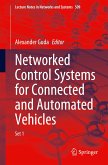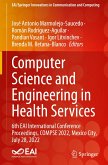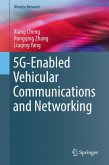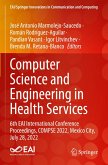Springer Handbook of Internet of Things
Herausgegeben:Ziegler, Sébastien; Radócz, Renáta; Quesada Rodriguez, Adrian; Matheu Garcia, Sara Nieves
Springer Handbook of Internet of Things
Herausgegeben:Ziegler, Sébastien; Radócz, Renáta; Quesada Rodriguez, Adrian; Matheu Garcia, Sara Nieves
- Gebundenes Buch
- Merkliste
- Auf die Merkliste
- Bewerten Bewerten
- Teilen
- Produkt teilen
- Produkterinnerung
- Produkterinnerung
This handbook is an authoritative, comprehensive reference on Internet of Things, written for practitioners, researchers, and students around the world. This book provides a definitive single point of reference material for all those interested to find out information about the basic technologies and approaches that are used to design and deploy IoT applications across a vast variety of different application fields spanning from smart buildings, smart cities, smart factories, smart farming, building automation, connected vehicles, and machine to machine communication. The book is divided into…mehr
Andere Kunden interessierten sich auch für
![Springer Handbook of Electronic and Photonic Materials Springer Handbook of Electronic and Photonic Materials]() Springer Handbook of Electronic and Photonic Materials216,99 €
Springer Handbook of Electronic and Photonic Materials216,99 €![Springer Handbook of Augmented Reality Springer Handbook of Augmented Reality]() Springer Handbook of Augmented Reality291,99 €
Springer Handbook of Augmented Reality291,99 €![Performability in Internet of Things Performability in Internet of Things]() Performability in Internet of Things77,99 €
Performability in Internet of Things77,99 €![Networked Control Systems for Connected and Automated Vehicles Networked Control Systems for Connected and Automated Vehicles]() Networked Control Systems for Connected and Automated Vehicles226,99 €
Networked Control Systems for Connected and Automated Vehicles226,99 €![Computer Science and Engineering in Health Services Computer Science and Engineering in Health Services]() Computer Science and Engineering in Health Services169,99 €
Computer Science and Engineering in Health Services169,99 €![5G-Enabled Vehicular Communications and Networking 5G-Enabled Vehicular Communications and Networking]() Xiang Cheng5G-Enabled Vehicular Communications and Networking93,99 €
Xiang Cheng5G-Enabled Vehicular Communications and Networking93,99 €![Computer Science and Engineering in Health Services Computer Science and Engineering in Health Services]() Computer Science and Engineering in Health Services169,99 €
Computer Science and Engineering in Health Services169,99 €-
-
-
This handbook is an authoritative, comprehensive reference on Internet of Things, written for practitioners, researchers, and students around the world. This book provides a definitive single point of reference material for all those interested to find out information about the basic technologies and approaches that are used to design and deploy IoT applications across a vast variety of different application fields spanning from smart buildings, smart cities, smart factories, smart farming, building automation, connected vehicles, and machine to machine communication. The book is divided into ten parts, each edited by top experts in the field. The parts include: IoT Basics, IoT Hardware and Components, Architecture and Reference Models, IoT Networks, Standards Overview, IoT Security and Privacy, From Data to Knowledge and Intelligence, Application Domains, Testbeds and Deployment, and End-User Engagement. The contributors are leading authorities in the fields of engineering and represent academia, industry, and international government and regulatory agencies.
Hinweis: Dieser Artikel kann nur an eine deutsche Lieferadresse ausgeliefert werden.
Hinweis: Dieser Artikel kann nur an eine deutsche Lieferadresse ausgeliefert werden.
Produktdetails
- Produktdetails
- Springer Handbooks
- Verlag: Springer / Springer International Publishing / Springer, Berlin
- Artikelnr. des Verlages: 978-3-031-39649-6
- Seitenzahl: 1028
- Erscheinungstermin: 22. Oktober 2024
- Englisch
- Abmessung: 285mm x 215mm x 57mm
- Gewicht: 3001g
- ISBN-13: 9783031396496
- ISBN-10: 3031396499
- Artikelnr.: 68322165
- Herstellerkennzeichnung Die Herstellerinformationen sind derzeit nicht verfügbar.
- Springer Handbooks
- Verlag: Springer / Springer International Publishing / Springer, Berlin
- Artikelnr. des Verlages: 978-3-031-39649-6
- Seitenzahl: 1028
- Erscheinungstermin: 22. Oktober 2024
- Englisch
- Abmessung: 285mm x 215mm x 57mm
- Gewicht: 3001g
- ISBN-13: 9783031396496
- ISBN-10: 3031396499
- Artikelnr.: 68322165
- Herstellerkennzeichnung Die Herstellerinformationen sind derzeit nicht verfügbar.
Dr. Sébastien Ziegler has served as President of the International Internet of Things Forum (IoT Forum) and IoT Lab, two organizations that support international cooperation in the ICT and IoT research domains. As Rapporteur on emerging technologies at the International Telecommunication Union for the study group on Internet of Things and smart cities (SG20), he has led the standardization of several standards, recommendations, and supplements for the Internet of Things. He serves as Director General of Mandat International, a foundation promoting international cooperation and international research, with special consultative status to the UN (ECOSOC) and a sector member of the ITU. He also serves as Chair of the Europrivacy International Board of Experts, and previously served as Vice-Chair of the IEEE Communications Society Subcommittee on the Internet of Things. Dr. Sébastien Ziegler holds a Ph.D. in Information Systems at the Faculty of Economy and Management of the University of Geneva. He graduated in International Relations at the Graduate Institute of International Studies, followed by a Master in Environment, an MBA in International Administration (HEC Geneva), and complementary executive courses at Harvard Business School in Boston, Stanford University, UC Berkeley, and EPFL. Dr. Sébastien Ziegler founded several foundations, organizations, and companies, and he initiated several international research projects in the area of ICT, with a focus on the Internet of Things, IPv6, sustainable development, and privacy. He has participated in over 30 international research projects, including in the domain of ICT research infrastructures. With a multi-disciplinary academic profile, combining international law, science, economics, and environment, he is a relentless promoter of research, innovation, and international cooperation. Renata Radocz is a project manager and security professional with a passion for information and communication technologies, capacity building, and knowledge management. Renáta holds a master's degree in Crisis and Security Management from Leiden University. She also has a solid foundation in international relations with a specialized focus on European affairs, holding a degree from University of Szeged. As a Member of the Europrivacy International Board of Experts at the European Centre for Certification and Privacy, Ms Radócz actively supports the development and continuous improvement of the Europrivacy Certification Scheme. Her inputs have contributed to the shaping and refining of the certification process, and her leadership has been instrumental in the development of numerous training programs for the Europrivacy Academy, encompassing both onsite and online activities. Currently, Ms Radócz serves as a key member of the Mandat International team where she manages several international projects, her work primarily revolving around Internet of Things, AI, and other emerging technologies research, exploring their security and privacy implications to ensure a safer and more protected digital landscape. Her work spans qualitative research, dissemination activities, and standardization particularly in areas of eHealth, Earth observation, and research infrastructures. Adrian Quesada Rodriguez is a lawyer and mediator specialized in personal data protection and new technologies. Having obtained his law degrees (Ba. Lic.) at the University of Costa Rica and the associated recognition of his early work on Data Protection and convergent telecommunications with the first place in the 2014 Ibero-American Personal Data Protection Research Awards (held by the Spanish Data Protection Authority), Mr. Quesada Rodriguez pursued Master's degrees in both International Law (IHEID, Switzerland) and Telecommunications Economics (UNED, Spain). He was recognized as a Privacy by Design Ambassador (Office of the Information and Privacy Commissioner of Ontario, Canada); and is a Certified Information Privacy Professional for Europe, Certified Information Privacy Manager, and Fellow of Information Privacy of the International Association of Privacy Professionals (IAPP). His professional experience ranges from various outreach and research positions on intellectual property and cybersecurity (UCR), Internet, standards, and regulations (Internet Society/Mandat International, ITU), digital policy (DiploFoundation), project management and personal data protection (IoTLab, Mandat International, and UDG Alliance); to executive work in mediation (UCR), governance (IGF Secretariat), and the aerospace sector (IATA, ACAE). Mr. Quesada Rodriguez currently serves as Senior Manager and Lead Researcher on law and ICT at Mandat International, where he has led research and compliance activities in various international (H2020 & Horizon Europe) projects. He is currently an Associate Rapporteur for emerging digital technologies, terminology, and definitions at the International Telecommunications Union (ITU-T SG20 Q5) and is also a member of the Europrivacy International Board of Experts where he co-authored the certification scheme's core personal data protection evaluation criteria, adopted as European Data Protection Seal by the EDPB. Dr. Sara Matheu graduated in Mathematics and Computer Engineering at the University of Murcia. With the support of a Collaboration Scholarship, she began working on security protocols and bootstrapping for the Internet of Things (IoT) under the guidance of Dr. Rafael Marín López. After that, she obtained a national FPU (University Teaching Training) contract from the Spanish Ministry of Education to pursue her Ph.D. This allowed her to obtain an international Ph.D. with the supervision of Dr. Antonio Skarmeta and Dr. José Luis Hernández Ramos from the University of Murcia. She has served as a Lecturer in the Computer Engineering degree program and the Master's programs in New Information Technologies, cybersecurity, and software development at the University of Murcia. Additionally, she has actively participated in more than 10 national and international projects. Her research line, focused on security certification, has enabled her to collaborate with significant organizations such as the European Cyber Security Organisation (ECSO) toward the establishment of a common European certification framework, aligning her research with the objectives of the European regulation approved in 2019 (Cybersecurity Act). Her achievements have been recognized with prestigious awards, including the Scientific Society of Computer Science in Spain (SCIE) - BBVA Foundation Research Award in the category of Young Computer Scientists 2021, the RENIC Award in Cybersecurity for the Best Doctoral Thesis, and the Extraordinary Doctorate Award. Currently, she is a Postdoctoral Researcher at the University of Murcia, actively participating in several European projects. She has made significant contributions to numerous international conferences, published her research in high impact journals and book chapters, and has served as a reviewer for various conferences. Furthermore, she is actively engaged in disseminating research within society through participation in events like Researchers' Night, DIATIC, and Science Week, and has conducted over 20 radio and TV interviews, workshops, and podcasts.
Introduction.- Part A: IoT Basics.- IoT Brief History.- IoT Definitions.- IoT Tags - IoT Hardware.- Part B: IoT Network Architecture and Interoperability.- Architecture.- Cloudification/IoT Platforms.- Edge Computing and Distributed Intelligence.- Multiprotocol Interoperability.- Wireless Communication.- Integration of IoT and Satellite Networks in Emerging 5G Systems.- Part C.- IoT Security and Privacy.- IoT Security Threats and Risk Analysis.- Authentication and Authorization Framework for IoT.- IoT Security Monitoring Tools and Models.- Trusted IoT and Testing.- Part D: From Data to Knowledge and Intelligence.- IoT and Data Protection.- Data Models and Contextual Information.- Ontologies and Semantic Interoperability.- Data Analytics and Artificial Intelligence.- Artificial Intelligence of Things.- Part E: Standards.- Study of LoRa PHY Protocol and LoPaWAN Networcs.- Application Layer Protocols.- Security Fundamentals.- Part F: Application Domains.- Smart Cities.- Smart Agriculture.- Making Smart Agriculture Smarter.- Optimizing Operations in IoT Enabled Smart Grid.- IoT in Large Scale Events.- Smart Homes and Buildings.- Connected Vehicles.- eHealth and Ageing Well.- IoT for Sustainable Development.- Technological views for IoT for Sustainable Development.- Smart water management.- Part G: End-User Engagement and validation.- End-User Engagement Methodologies.- Co-Creation.- Living Labs.- Crowdsourcing tools and IoT Labs.- Part H: IoT Deployment and Management.- IoT roadmap for smart factories and supply chain organizations.- IoT Business Models.
Introduction.- Part A: IoT Basics.- IoT Brief History.- IoT Definitions.- IoT Tags - IoT Hardware.- Part B: IoT Network Architecture and Interoperability.- Architecture.- Cloudification/IoT Platforms.- Edge Computing and Distributed Intelligence.- Multiprotocol Interoperability.- Wireless Communication.- Integration of IoT and Satellite Networks in Emerging 5G Systems.- Part C.- IoT Security and Privacy.- IoT Security Threats and Risk Analysis.- Authentication and Authorization Framework for IoT.- IoT Security Monitoring Tools and Models.- Trusted IoT and Testing.- Part D: From Data to Knowledge and Intelligence.- IoT and Data Protection.- Data Models and Contextual Information.- Ontologies and Semantic Interoperability.- Data Analytics and Artificial Intelligence.- Artificial Intelligence of Things.- Part E: Standards.- Study of LoRa PHY Protocol and LoPaWAN Networcs.- Application Layer Protocols.- Security Fundamentals.- Part F: Application Domains.- Smart Cities.- Smart Agriculture.- Making Smart Agriculture Smarter.- Optimizing Operations in IoT Enabled Smart Grid.- IoT in Large Scale Events.- Smart Homes and Buildings.- Connected Vehicles.- eHealth and Ageing Well.- IoT for Sustainable Development.- Technological views for IoT for Sustainable Development.- Smart water management.- Part G: End-User Engagement and validation.- End-User Engagement Methodologies.- Co-Creation.- Living Labs.- Crowdsourcing tools and IoT Labs.- Part H: IoT Deployment and Management.- IoT roadmap for smart factories and supply chain organizations.- IoT Business Models.

